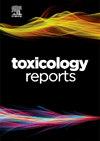安全性评估:谷氨酸棒状杆菌生产的三种生物质产品的体外反向突变和体内急性经口毒性试验
Q1 Environmental Science
引用次数: 0
摘要
微生物发酵已成为可持续生产必需品和化学品的关键过程。谷氨酸棒杆菌是一种熟练的平台生物,通过微生物发酵为氨基酸生产做出了巨大贡献。尽管谷氨酸棒杆菌的安全性已得到公认,但与其他生物相比,高效生物合成天然产品仍面临挑战。本研究通过细菌反向突变试验(AMES 试验)和大鼠急性经口毒性试验这两项不同的毒理学研究,评估了生物工程谷氨酸球菌生物质产品的安全性。对三种干发酵生物质产品进行了检测,每种产品都能提高特定氨基酸(L-赖氨酸、L-苏氨酸和 L-色氨酸)的产量。测试按照经济合作与发展组织的指导原则进行,结果显示,在测试剂量下没有诱变性或急性毒性。这些研究结果表明,生物工程谷氨酸棒状杆菌的生物质产品作为潜在的饲料原料是安全的,但建议进行进一步的毒性研究以进行全面评估。这项研究强调了严格的安全评估对推进生物技术应用的重要性,并为微生物发酵产品在各行业的潜在利用提供了宝贵的见解。此外,本研究还强调了遵守法规和国际标准对于确保新型生物技术产品的安全性和有效性的重要意义。本文章由计算机程序翻译,如有差异,请以英文原文为准。
Assessment of safety: In vitro reverse mutation and in vivo acute oral toxicity tests of three biomass products from amino acid-producing Corynebacterium glutamicum
Microbial fermentation has emerged as a pivotal process for sustainable production of essential goods and chemicals. Corynebacterium glutamicum is a proficient platform organism that contributes significantly to amino acid production through microbial fermentation. Despite its recognized safety, challenges persist in efficiently biosynthesizing natural products compared with other organisms. This study evaluated the safety of biomass products from bioengineered C. glutamicum through two different toxicological studies: a bacterial reverse mutation test (AMES test) and an acute oral toxicity test in rats. Three types of dried fermentation biomass products, each engineered for the enhanced production of specific amino acids (L-lysine, L-threonine, and L-tryptophan), were examined. The tests were conducted in compliance with Organization for Economic Co-operation and Development guidelines and revealed no mutagenicity or acute toxicity at the tested doses. These findings suggest the safety of biomass products from bioengineered C. glutamicum as potential feed materials, although further toxicity studies are recommended for comprehensive evaluation. This study underscores the importance of stringent safety assessments for advancing biotechnological applications and provides valuable insights into the potential utilization of microbial fermentation products in various industries. Moreover, this study highlights the significance of regulatory compliance and adherence to international standards to ensure the safety and efficacy of novel biotechnological products.
求助全文
通过发布文献求助,成功后即可免费获取论文全文。
去求助
来源期刊

Toxicology Reports
Environmental Science-Health, Toxicology and Mutagenesis
CiteScore
7.60
自引率
0.00%
发文量
228
审稿时长
11 weeks
 求助内容:
求助内容: 应助结果提醒方式:
应助结果提醒方式:


